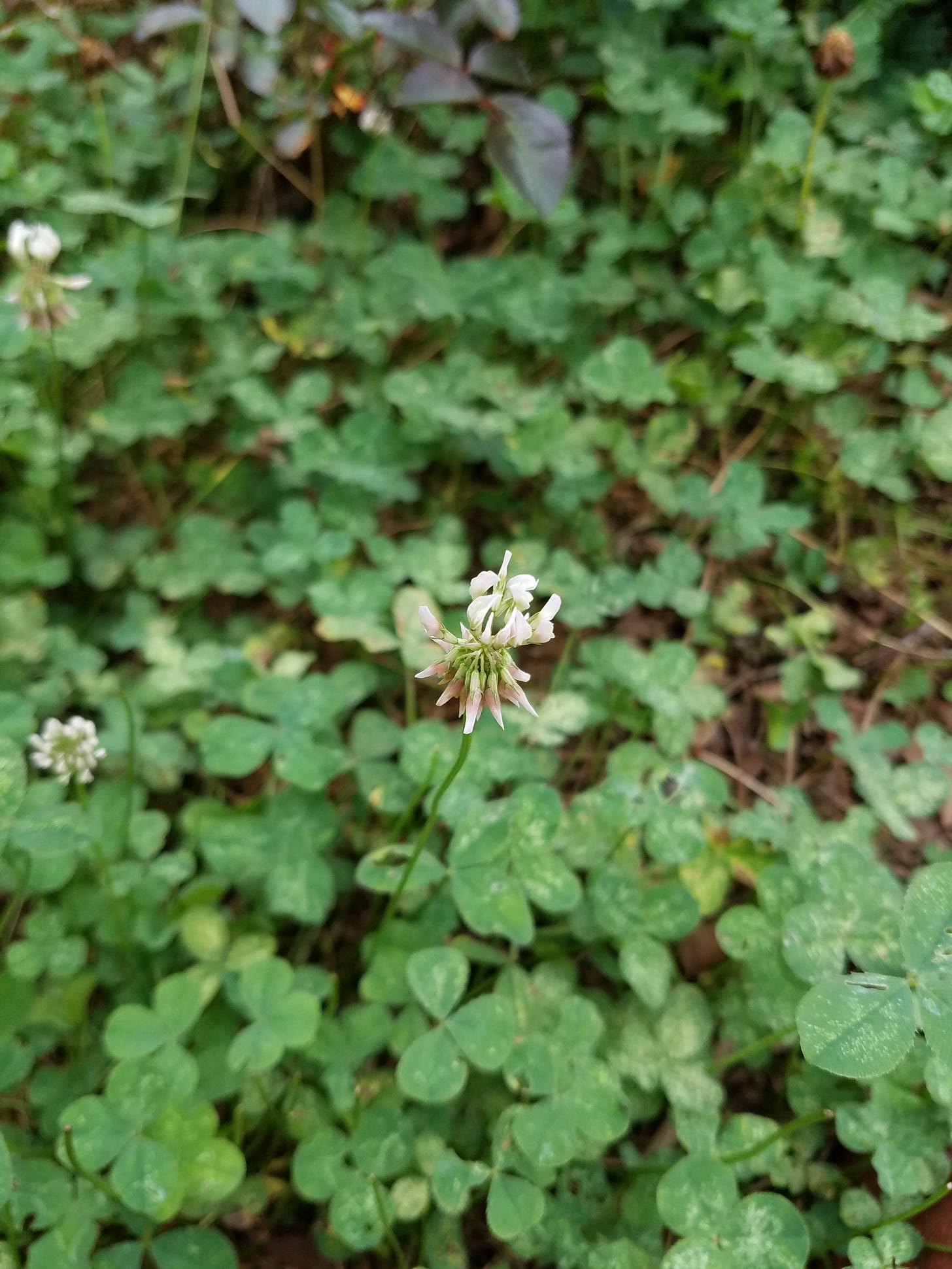Clover
Thoughts on a useful non-native plant
A few years ago I decided to mow paths in the former cornfield now known as the Savanna. It ceased to be cultivated about 15 years ago and was allowed to revert to nature. For several years only the toughest annual weeds survived in the played-out soil, but eventually the vegetation thickened, and I realized that the unchecked growth of wild blackberries would soon prevent access for human visitors. Choosing the paths somewhat randomly, we took turns crawling across the overgrown field on our ancient Wheelhorse, making sure the trails meandered. Long vistas are wonderful, but twists and turns create mystery and the feel of a much larger space.
At first the persistent stubs of thick-stemmed plants remained in the paths, necessitating shoes or at least decent flip flops to ensure a pain-free experience. Gradually, after numerous mowings, stubble gave way to soft clover, lespedeza, and various grasses that cushion and cool the feet of those willing and able to forego footwear. The cooling effect is especially noticeable on the clover patches. On hot days I look ahead with anticipation to the darker areas of clover, knowing that a little air-conditioned pocket awaits.
The effect is so conspicuous that it's tempting to believe the the plant has magical properties that cool the space immediately above it, and in a way it does. The scientific explanation probably goes like this: Clover thrives in slight depressions where rainfall gathers and its broad leaves readily transpire the excess moisture that is unavailable to plants in higher and dryer spots. The process of water evaporating uses heat energy and makes the immediately surrounding area feel cooler. It's a bit like the plants are sweating to cool themselves down, and extend the favor to anyone nearby.
In the description above, clover lives, but like a cog in a machine. It grows in specific spots because certain conditions are met, and is stuck there, following the rules of physics. Is it any less accurate to say that clover has shown up to heal, nourish, and cool the land, and soothe our feet? The more I walk the paths, the more I think of clover as a friend who has decided to move in and give aid. That's the danger of spending time in nature: You start thinking that the scientific explanation is the primitive one, and the one in which plants are magical beings with agency as the more advanced. Perhaps nature trails should be posted with warning signs for those who view this as regression.
Of course, to the lawn purists, white clover is a bothersome invasive. These folks are unlikely to view plants as personal friends and allies, even the beloved fecsues and ryes that make their lawns possible. More likely they look at turf grasses as servants who must fulfill their duty by staying lush, green, and pristine or risk being terminated by a sod stripper and replaced. They're unlikely to admire the tenacity of clover seeds that survived a trans-Atlantic journey in the guts of ruminants to arrive on these shores and begin the process of colonization.
As I reread the last sentence, I think about the negative connotations of the words I used. White clover, like white people, honey bees, and nightcrawlers, sounds like just another European invader. Now it doesn't seem like such a good idea to assign clover agency to move around at will. The urge is great to retreat to familiar classifications and their concomitant judgements — like native, indigenous equals good, and exotic, European, colonizer equals bad.
How does lowly clover, Trifolium repens, literally “three leaves creeping,” fit in? It is indeed exotic, but brings with it many benefits beyond its cooling effects. In the pastures it provides delicious and nutritious forage to livestock, while enriching soils with nitrogen. On the Savanna, it doesn't strangle out existing vegetation, but humbly offers its gifts, then moves aside when the land is ready for a greater diversity of forbs, shrubs, and trees. In my garden it acts as a no-input living mulch that I can pull out at any time and compost if I like. It's an incredibly valuable plant, and one that defies being pigeonholed.
This might present a problem for those who crave clear-cut delineations — which to be honest is many of us in a world of increasingly ambiguous reality. It seems to me that the appeal of movements like veganism, wokism, and gender ideology is that they offer convenient, pre-packaged hierarchies and rules for thought and conduct, under the guise of inclusion, tolerance, and morality. Environmental, permaculture, and even just plain gardening spaces do not escape these trends — they mirror them. There are sides to be chosen and rules to be followed. Plant only native. Kill your lawn. Never rake your leaves. Never disturb your soil. Kill all Chinese mantids. Avoid herbicides, unless you're killing invasives in which case their use is mandatory. Beginners naturally seek guidance as they learn, but when guidelines morph into rigid rules and purity tests, it's time to look for an alternative.
Fortunately the solution is straightforward: creating a relationship with land and its inhabitants as a path to making good decisions. My association with clover is unproblematic because we've spent quality time together, and it doesn't bother me that it originated far away and colonized this region fairly recently. I'm comfortable with the level of reciprocity, and in fact I feel clover gives more than it take. And most importantly, it doesn't ultimately matter if I view clover as a helpful ally or a foreign invader because I'd never be able to get rid of it even if I wanted to. I might as well enjoy the cool spots.







I love to hear your philosophizing about plants, and I don't think it's wrong to recognize their "magical properties." I for one am tired of hearing a scientific reason for every last thing. Regarding the quest to eliminate all invasive species, I understand the impulse (it borders on a passion with some people) but as I walk in the hills of the SF Bay Area and point my plant ID app at the flowers and grasses I want to learn the names of, I realize that the majority of these are not from here at all. It's a battle that was lost long ago and ultimately we have to believe that "earth abides."